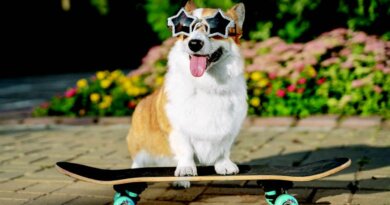Leaving Your Dog Home Alone? Here’s What You Should Do
This post may contain affiliate links. We may earn money or products from the companies mentioned in this post.
Are you thinking about leaving your dog home alone for the first time?
Now that the COVID pandemic is over, many dogs are faced with this reality as their pawrents are returning to their no-dogs-allowed work cubicles.
…but how long can you leave a dog home alone in the house, and don’t dogs hate being left alone in the first place?
And what about separation anxiety?
In this blog post, we’ll provide answers as well as lots of tips and hacks so you won’t have to feel guilty for leaving your dog home alone.
How Long Can You Leave Your Dog Home Alone?
Thankfully, there are several support systems that make leaving your dog home alone-ish doable.
I’ll explain the -ish in the section titled “How to Leave Your Dog Home Alone”!
But first, let me preface this particular section by saying that leaving your dog home alone for 8-12 hours is not OK.
Sure, there’s the occasional emergency situation that may warrant this scenario, but generally speaking, please don’t make this time frame a habit because it’s not healthy.
As a matter of fact, it can cause UTIs and stones, and that’s just an unnecessary expense you’ll have to deal with at the vet’s.
Additionally, a full bladder can make a dog anxious and contributes to frustrated barking, pacing or even destroying your furniture.
Definitely something you want to avoid, especially if you live in an apartment complex where neighbors may complain about noise.
Keeping that in mind, it’s fine to leave your healthy adult dog home alone for 4-6 hours without a potty break.
I say healthy because sick dogs may need more frequent potty breaks, especially if they’re suffering from a urinary tract infection or have diarrhea.
So if your pup gets their walk/potty break from 6-7am and you leave for work at 7:30am, they’ll need to go potty again at around 1pm, and then again around 6:30pm.
Of course, that also depends on the amount of water your dog has access to while they’re alone.
If they drink a lot of water, they may have to go out sooner than 1pm and 6:30pm.
How Many Times Do Puppies Have to Go Out?
Puppies are a different story because they need very frequent potty breaks.
In fact, it’s important to give your puppy the opportunity to relieve themselves as needed in the context of your puppy’s successful house training strategy.
As a rule of thumb, puppies can hold it for their age in months + one hour. So a 2 month old puppy can hold it for about 3 hours, a 3 month old puppy can hold it for 4 hours, etc.
However, you shouldn’t ask your puppy (or adult dog!) to hold it for longer than 6 hours, 8 hours at an absolute maximum.
It’s simply not fair to ask your dog to hold it for extended periods of time – imagine the accidents you’d have if someone asked you to hold it for hours on end!
Additionally, know that puppies will have to eliminate after every nap they wake up from, fairly quickly after mealtime, as well as in-between and after playtime.
How to Leave Your Dog Home Alone
Now that you know how often your pup(py) needs a potty break, let’s look at HOW to make that happen while they’re home alone.
Potty Breaks Using Dog Doors
First, the most practical solution.
If you’re a homeowner with a fenced-in yard, one option is to install a doggie door that leads into your yard.
If you’re renting a home with a yard, make sure to get permission from your landlord or landlady prior to installing a doggie door.
There’s a variety of pet door options that install either on an existing door or even on a wall.
But with this option, you really have to know and trust your dog not to get themselves into trouble!
For example, are you sure your pup won’t dig their way into freedom under the fence?
Is there no backyard composting area they may want to investigate a bit too closely?
Or herb/veggie/flower garden they’d be interested in “harvesting”?
Also, if your pup’s a purebred, expensive dog, be aware of dognapping by dog thieves who scope out neighborhood yards.
It helps to put solid locks on your fence on both sides in addition to having battery powered outdoor pet cameras set up.
You can mount them on the outside of your house or set them up in a nearby tree. Bonus: Their built-in microphone lets you talk to your pets (or thieves!).
Hiring Dog Walkers/Pet Sitters
Now here’s where the -ish comes into play…
As a former professional dog walker and pet sitter, I’m here to tell you that hiring a dog walker may be your best choice if you can’t make it home for lunch and if a doggie door is not an option.
Funny enough, there were times when my daily dog walking schedule was so booked that I had to hire a dog walker for my OWN dogs at lunchtime!
While it’s obviously an expense, you may only have to hire a dog walker once a day for lunch.
That’s if you have adolescent kids who’ll be home from school before you’ll be back from work.
Or maybe you’ll get away with hiring a dog walker a couple times a week.
For example, if you have a trustworthy neighbor who can pop over and give your dog a 30 minute potty break on those other days.
Either way, the huge benefit of having a trustworthy neighbor or dog walker care for your pup is the human interaction and TLC they’re providing.
For an active dog, they’ll also benefit from a midday outlet for their energy in the form of a walk, jog or frisbee time in the yard.
That’s not something a dog door can compete with!
To find a local professional dog walker or pet sitter near you, check out one of the following options:
Leaving Your Dog Home Alone Overnight?
One more note on a pet sitter-specific service: overnight stays.
Overnight stays mean exactly what they imply. Your pet sitter spends the night, usually a 12 hour time window, at your home with your dog.
So if you’re contemplating leaving your dog home alone overnight, may I suggest that you look into this service?
I used to offer it myself and both dogs and owners always loved the company and peace of mind it provided.
Many dogs I spent the night with were senior pups with weak bladders who couldn’t make it 8 hours, let alone 12, without a potty break.
How Do I Leave My Dog Home Alone for The First Time?
Of course there’s a first time for everything, and the best way of easing your pup(py) into it is to start with VERY short periods of leaving your dog home alone.
As In Minute Increments!
That’s how I successfully got my puppies Missy & Buzz used to staying alone for a few hours.
The first time I left them “alone” in my apartment was for one minute when all I did was step outside my front door. At the time, they were about 10 weeks old.
I gradually increased that time by the minute.
Here’s something else I did.
Edible Dog Food Puzzles Paired With Crates
I made sure they were busy with a yummy filled Kong dog toy they got to enjoy in their respective dog wire crates.
Dog play pens work too.
You can fill the Kongs with any type of food your dog enjoys. For example:
They come in a variety of thicknesses suitable for puppies, adult dogs, senior pups and power chewers AND are dishwasher-safe too.
That makes cleaning up super easy if you fill them with anything sticky such as a peanut butter-pumpkin purée kibble mix.
Or raw dog food if you’re a raw feeder like myself!
To make the experience last as long as possible, you can also go ahead and freeze the Kongs for a few hours.
Of course, stuffable Nylabone dog chew toys work too.
What About Hard Dog Chews?
I know there are some people who are successfully leaving their dogs home alone with harder recreational chew toys such as elk antler dog chews.
Personally, I prefer not to do that because I don’t love the choking/tooth breaking risk.
Buzz once broke a molar on one of those smoked, super hard and oversized beef bones you can get at most grocery stores – and that was while I was home with the pups!
This was also before I switched Missy & Buzz to raw dog food including SOFT raw meaty bones, and before I learned that those hard recreational chews can do some real damage.
At the end of the day, hard recreational dog chews will keep your dog busy, but it’s a personal decision if you want to take the risks associated with it or not.
Don’t get me wrong, your dogs may very well never have an issue with these! It just depends.
Do Dogs Know You Are Leaving?
Now, here’s the thing.
Just like us humans, dogs are creatures of habit and can get used to a new routine fairly quickly.
Plus, they’re masters at reading our body language and emotions!
That means they know what’s about to happen when you grab your keys, jacket and briefcase or purse and head for the garage door in the mornings. Especially when you feel bad about it.
Let me emphasize that for clarity. They know when you feel bad about leaving your dog home alone!
This understanding can quickly cause separation anxiety issues, so it’s best to nip it in the bud right from the get go.
How to Prevent Separation Anxiety
The best way to prevent separation anxiety is not to feel bad for leaving your dog home alone.
So when you’re about to leave, don’t feel bad, especially knowing that you properly exercised your pup, they’re about to eat breakfast and then settle in for a nice long morning nap…
Breed Specific Exercise
…because you did exercise your pup, right?
That’s a morning activity you shouldn’t skip. Especially when your best furry friend is an active dog with working genes.
We’re talking herding breeds (Border Collies, Shepherds), Retrievers (Labs, Goldens) or Terriers (Jack Russells, APBTs, etc).
Yep, Jack Russels were bred to work too, did you know that? Specifically to hunt vermin.
Don’t let the size of a dog fool you – some small dogs may need as much exercise as larger pups!
If you have an hour to spend exercising your dog before leaving for work in the morning, use it in a way that caters to your dog’s specific energy levels.
A low energy dog may very well only need 30 minutes of slow sniffing around the neighborhood.
Medium energy dogs will likely be fine with an hour long walk, while higher energy pups will benefit from a more intense hour of exercise.
For example, a backpack walk or a run with your pup.
Don’t Make A Big Deal About Leaving & Coming Home
Also, don’t make a big deal about leaving. Just leave – you don’t even have to say anything to your dog that explains that you are, in fact, about to leave.
Just leave.
Do the same when you come home from work – don’t make a big deal about it and don’t celebrate your return home in a major way.
Just walk into your home, put all your things down, grab a glass of water, coffee or wine, then greet your dog.
Calmly.
That teaches our pups that calmly leaving the house and returning back home is just a normal part of their doggie day.
Eh. Nothing to get crazy over.
Bottom Line
Now you know that leaving your dog home alone is possible, but 8-12 hour stretches are not ideal because:
- Regular potty breaks are healthy
- High energy breeds need regular physical exercise to thrive
- Full bladders can contribute to anxiety and other problem behaviors
- Puppies need to eliminate very frequently after naps, meals and playtime
In general, healthy adult dogs can stay home alone for 4-6 hours, while puppies can make it 2-4 hours alone, depending on their age.
If you can’t make it home from work for lunch, a doggie door may be an inexpensive solution that takes care of your pup’s physical needs.
However, while a pet door may be enough for a more complacent Bulldog, an active German Shepherd or Weimaraner will definitely need that midday walk as well.
Keeping that in mind, you may want to ask your trustworthy next door neighbor to give your dog a potty break and some TLC, or hire a professional dog walker for a midday walk or run!
Do you leave your dog home alone?
What does your dog do when you leave?
Tell us about your experiences in the comment section below.
Save To Pinterest
Top Picks For Our Puppies
- BEST PUPPY TOY
We Like: Calmeroos Puppy Toy w/ Heartbeat and Heat Packs – Perfect for new puppies. Helps ease anxiety in their new home. - BEST DOG CHEW
We Like: Mighty Paw Naturals Bully Sticks – All of our puppies love to bite, nip, and chew. We love using Bully Sticks to help divert these unwanted behaviors. - BEST DOG TREATS
We Like: Crazy Dog Train-Me Treats – We use these as our high-value treats for our guide dog puppies. - BEST FRESH DOG FOOD
We Like: The Farmer’s Dog – A couple months ago we started feeding Raven fresh dog food and she loves it! Get 50% off your first order of The Farmer’s Dog.
Check out more of our favorites on our New Puppy Checklist.




